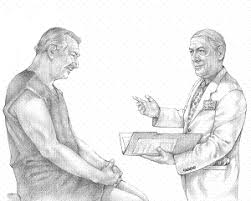There was a young woman who had been diagnosed with a
terminal illness and had been given three months to
live. So as she was getting her things "in order," she
contacted her pastor and had him come to her house to
discuss certain aspects of her final wishes. She told
him which songs she wanted sung at the service, what
scriptures she would like read, and what outfit she
wanted to be buried in.
Everything was in order and the Pastor was preparing
to leave when the young woman suddenly remembered
something very important to her. "There's one more
thing," she said excitedly.
"What's that?" came the pastor's reply. "This is very
important," the young woman continued. "I want to be
buried with a fork in my right hand."
The pastor stood looking at the young woman, not
knowing quite what to say. "That surprises you,
doesn't it?" the young woman asked. "Well, to be
honest, I am puzzled by the request," said the Pastor.
The young woman explained. "My grandmother once told
me this story, and from there on out, I have always
done so. I have also, always tried to pass along its
message to those I love and those who are in need of
encouragement.
terminal illness and had been given three months to
live. So as she was getting her things "in order," she
contacted her pastor and had him come to her house to
discuss certain aspects of her final wishes. She told
him which songs she wanted sung at the service, what
scriptures she would like read, and what outfit she
wanted to be buried in.
Everything was in order and the Pastor was preparing
to leave when the young woman suddenly remembered
something very important to her. "There's one more
thing," she said excitedly.
"What's that?" came the pastor's reply. "This is very
important," the young woman continued. "I want to be
buried with a fork in my right hand."
The pastor stood looking at the young woman, not
knowing quite what to say. "That surprises you,
doesn't it?" the young woman asked. "Well, to be
honest, I am puzzled by the request," said the Pastor.
The young woman explained. "My grandmother once told
me this story, and from there on out, I have always
done so. I have also, always tried to pass along its
message to those I love and those who are in need of
encouragement.
In all my years of attending socials and dinners, I
always remember that when the dishes of the main
course were being cleared, someone would inevitably
lean over and say, 'Keep your fork.' It was my
favorite part because I knew that something better was
coming...like velvety chocolate cake or deep-dish
apple pie. Something wonderful, and with substance.
So, I just want people to see me there in that casket
with a fork in my hand and I want them to wonder
"What's with the fork?" Then I want you to tell them:
"Keep your fork...the best is yet to come."
The pastor's eyes welled up with tears of joy as he
hugged the young woman good-bye. He knew this would be
one of the last times he would see her before her
death. But he also knew that the young woman had a
better grasp of heaven than he did. She had a better
grasp of what heaven would be like than many people
twice her age, with twice as much experience and
knowledge. She KNEW that something better was coming.
At the funeral people were walking by the young
woman's casket and they saw the cloak she was wearing
and the fork placed in her right hand. Over and over,
the Pastor heard the question "What's with the fork?"
And over and over he smiled.
During his message, the Pastor told the people of the
conversation he had with the young woman shortly
before she died. He also told them about the fork and
about what it symbolized to her. The pastor told the
people how he could not stop thinking about the fork
and told them that they probably would not be able to
stop thinking about it either. He was right.
So the next time you reach down for your fork, let it
remind you ever so gently, that the best is yet to
come. Friends are a very rare jewel, indeed. They make
you smile and encourage you to succeed. They lend an
ear, they share a word of praise, and they always want
to open their hearts to us. Show your friends how much
you care. Remember to always be there for them, even
when you need them more. For you never know when it
may be their time to "Keep your fork."
Cherish the time you have, and the memories you
share... being friends with someone is not an
opportunity but a sweet responsibility. Send this to
everyone you consider a FRIEND even if it means
sending back to the person who sent it to you.
And keep your fork.
always remember that when the dishes of the main
course were being cleared, someone would inevitably
lean over and say, 'Keep your fork.' It was my
favorite part because I knew that something better was
coming...like velvety chocolate cake or deep-dish
apple pie. Something wonderful, and with substance.
So, I just want people to see me there in that casket
with a fork in my hand and I want them to wonder
"What's with the fork?" Then I want you to tell them:
"Keep your fork...the best is yet to come."
The pastor's eyes welled up with tears of joy as he
hugged the young woman good-bye. He knew this would be
one of the last times he would see her before her
death. But he also knew that the young woman had a
better grasp of heaven than he did. She had a better
grasp of what heaven would be like than many people
twice her age, with twice as much experience and
knowledge. She KNEW that something better was coming.
At the funeral people were walking by the young
woman's casket and they saw the cloak she was wearing
and the fork placed in her right hand. Over and over,
the Pastor heard the question "What's with the fork?"
And over and over he smiled.
During his message, the Pastor told the people of the
conversation he had with the young woman shortly
before she died. He also told them about the fork and
about what it symbolized to her. The pastor told the
people how he could not stop thinking about the fork
and told them that they probably would not be able to
stop thinking about it either. He was right.
So the next time you reach down for your fork, let it
remind you ever so gently, that the best is yet to
come. Friends are a very rare jewel, indeed. They make
you smile and encourage you to succeed. They lend an
ear, they share a word of praise, and they always want
to open their hearts to us. Show your friends how much
you care. Remember to always be there for them, even
when you need them more. For you never know when it
may be their time to "Keep your fork."
Cherish the time you have, and the memories you
share... being friends with someone is not an
opportunity but a sweet responsibility. Send this to
everyone you consider a FRIEND even if it means
sending back to the person who sent it to you.
And keep your fork.


